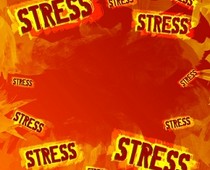How Stress and Alcohol Feed Off Each Other
A new study has come out trying to shed light on the relationship between stress and alcohol, and that it is a bi-directional relationship. This isn’t the first study, nor will it be the last, on alcohol and stress. It is a very complex relationship, and often hard to study because it sometimes relies on anecdotal reports.
Drinking, Stress and Panic Attacks
When I drank, I did so for many reasons. I always knew I drank more heavily when I was more anxious, but when I do more reflection my first panic attack was at a job I had a few years ago, where stress was an issue. I was newly out of college, working a lot of hours, and didn’t understand at the time that stress and anxiety were so closely related. I started drinking on weekdays, in many ways to decrease the stress and anxiety when I got home, and eventually this pattern led to heavier drinking periods, more blackouts and more acute panic attacks. I didn’t see the pattern at the time as an issue. This study sheds light on how stress and alcohol can feed one another.
Stress and Alcohol Feed Each Other
"The results demonstrated bi-directional relationships between alcohol and stress," said Emma Childs, research associate at The University of Chicago and corresponding author for the study. "Alcohol can change the way that the body deals with stress: it can decrease the hormone cortisol which the body releases to respond to stress, and it can prolong the feelings of tension produced by the stress. Stress can also change how alcohol makes a person feel: it can reduce the pleasant effects of alcohol or increase craving for more alcohol."
Stress Leading to More Alcohol Consumption
So not only does stress lead to more alcohol consumption, but the alcohol can actually change how we handle stress. This makes sense to me since the more I used alcohol as a way to “manage” things, I became more and more incapable of handling the stress and panic attacks. It appears from this study that my brain had learned to drink alcohol as a way to handle stress, and the more I drank, the more my brain wanted. Alcohol had become the go to option to handle stress, and it became the coping skill at the time, which eventually made me want more and more alcohol, partly due in part to my addictive personality, and maybe partly what this study is sharing.
Methods of the Study
I think it is important to note this was a small study, with 25 healthy men who performed either a stressful or non stressful task and then received intravenously administered infusions containing alcohol, which obviously aren’t normal drinking environments or situations.
Summary
I think this is an important study because stress is such a huge problem for many, and many people use alcohol, even in small amounts, to help take the edge off after a long day, and it is important to keep in mind this relationship could potentially make the response to stress worse and make people drink more alcohol.
As Childs concludes “By altering the way that our bodies deal with stress, we may be increasing the risks of developing stress-related diseases, not the least of which is alcohol addiction.”
Learning a Potentially Negative Coping Skill
Stress is such a prevalent struggle for many, leading to issues with anxiety, panic disorder, and substance abuse and I think this study helps shed some light on a very complex relationship. If people learn to use alcohol to manage stress, then this could forever change their coping skills, potentially leading to addiction issues. We need to share more awareness on how once we learn potentially negative coping skills, it can change the way our brain processes things, making it hard to change the cycle of what “works.” I always wanted the easy way out of stress and anxiety, and once I found alcohol did that, it continued the cycle. It was only in recovery and sobriety where I had to learn new ways to approach and handle stress, and that was very hard, since my brain wanted to go back to old behaviors that worked.
I know this study involved healthy men, and hope to see more studies similar to this with people who have addictive tendencies, because I wouldn’t be surprised if we see similar findings, which could help shed the light on high relapse rates in sobriety.
Did you ever use alcohol to manage stress? What consequences, if any, did you notice from this behavior/pattern?
APA Reference
Sebelius, K.
(2011, July 21). How Stress and Alcohol Feed Off Each Other, HealthyPlace. Retrieved
on 2026, March 5 from https://www.healthyplace.com/blogs/debunkingaddiction/2011/07/how-stress-and-alcohol-feed-off-each-other